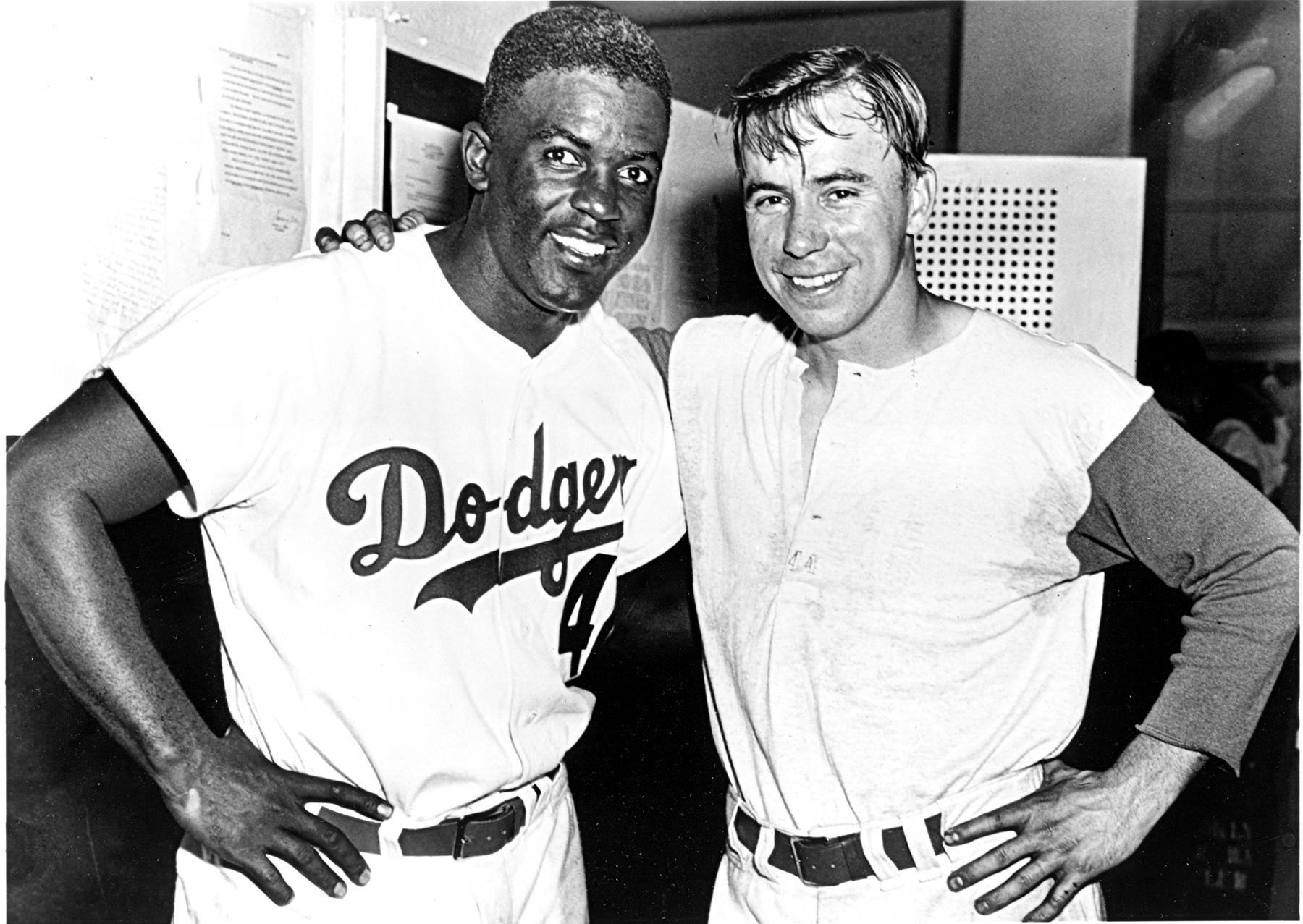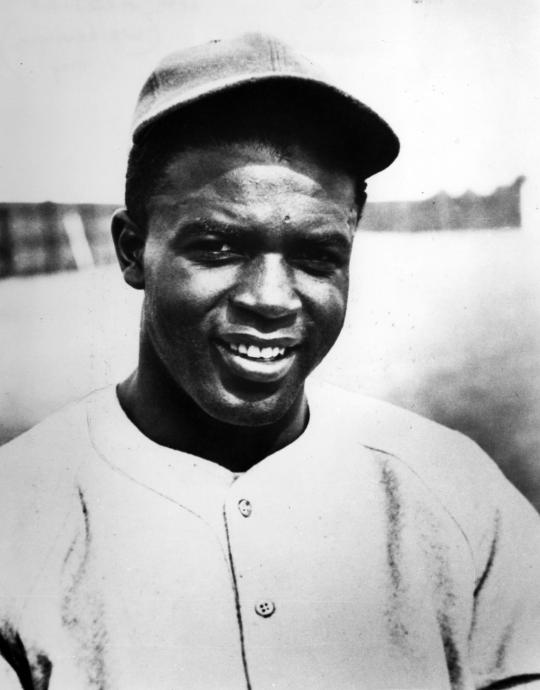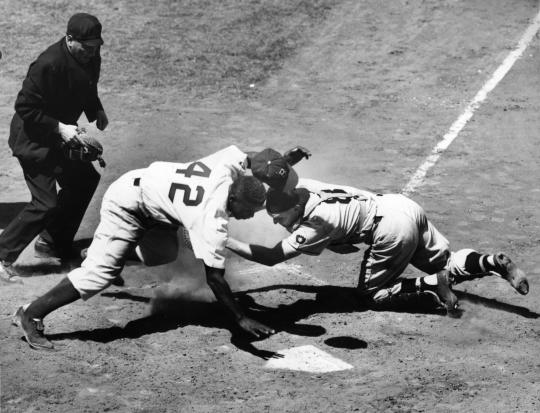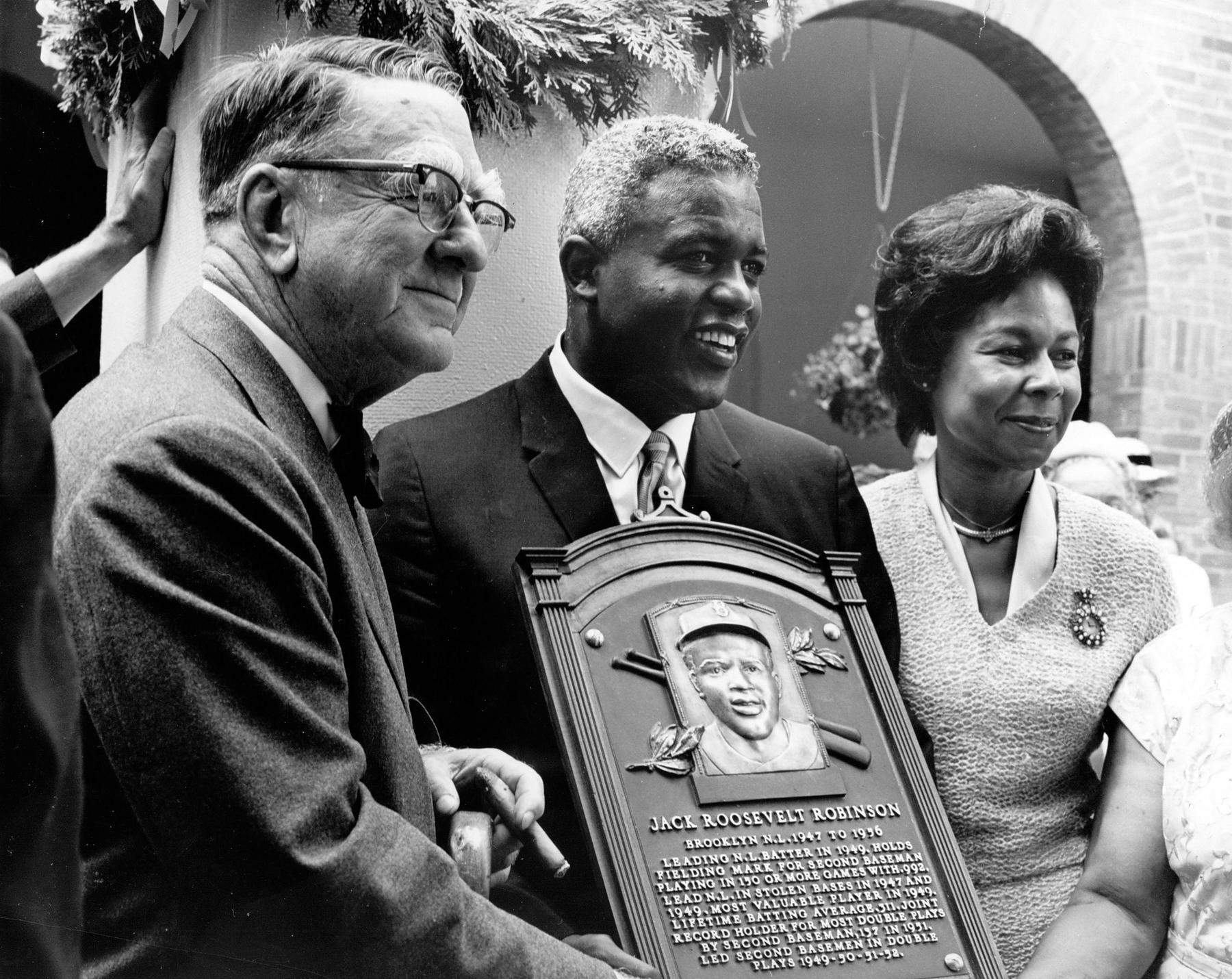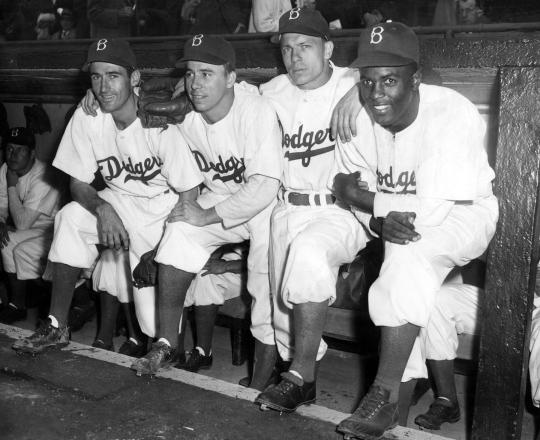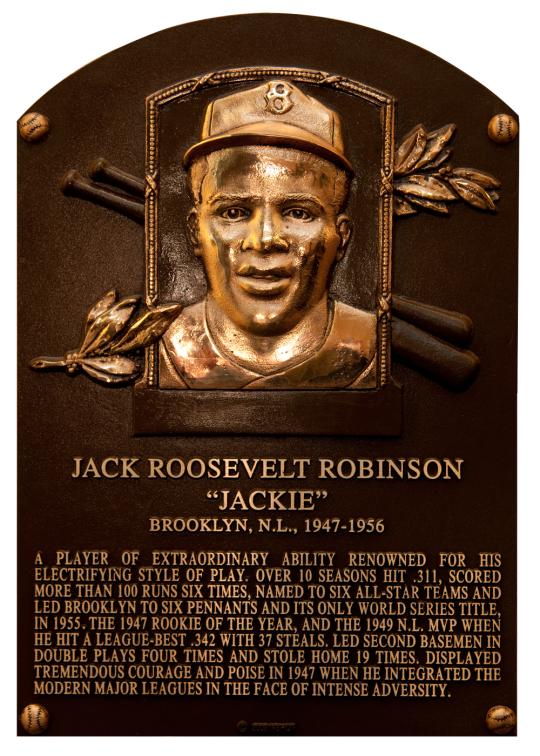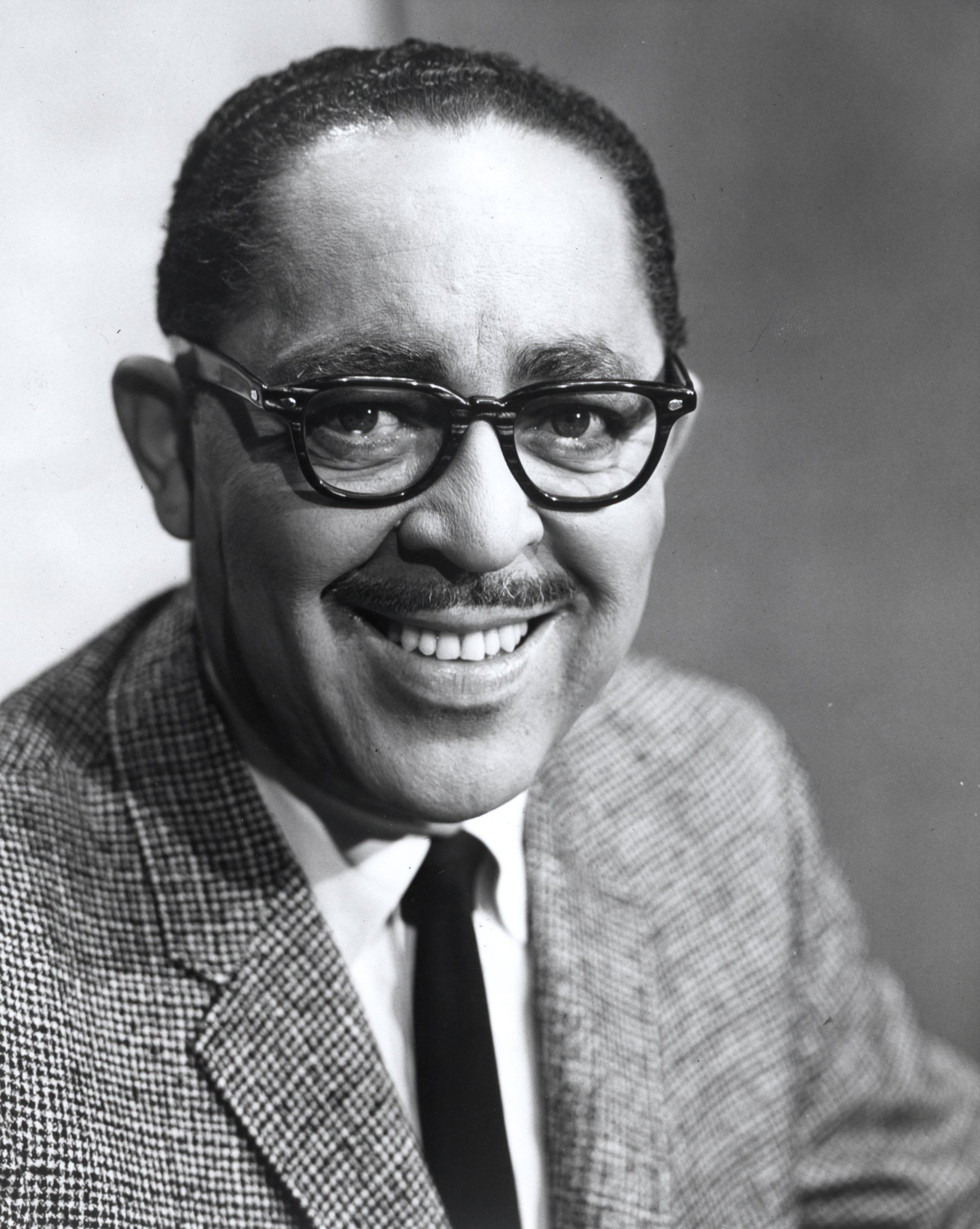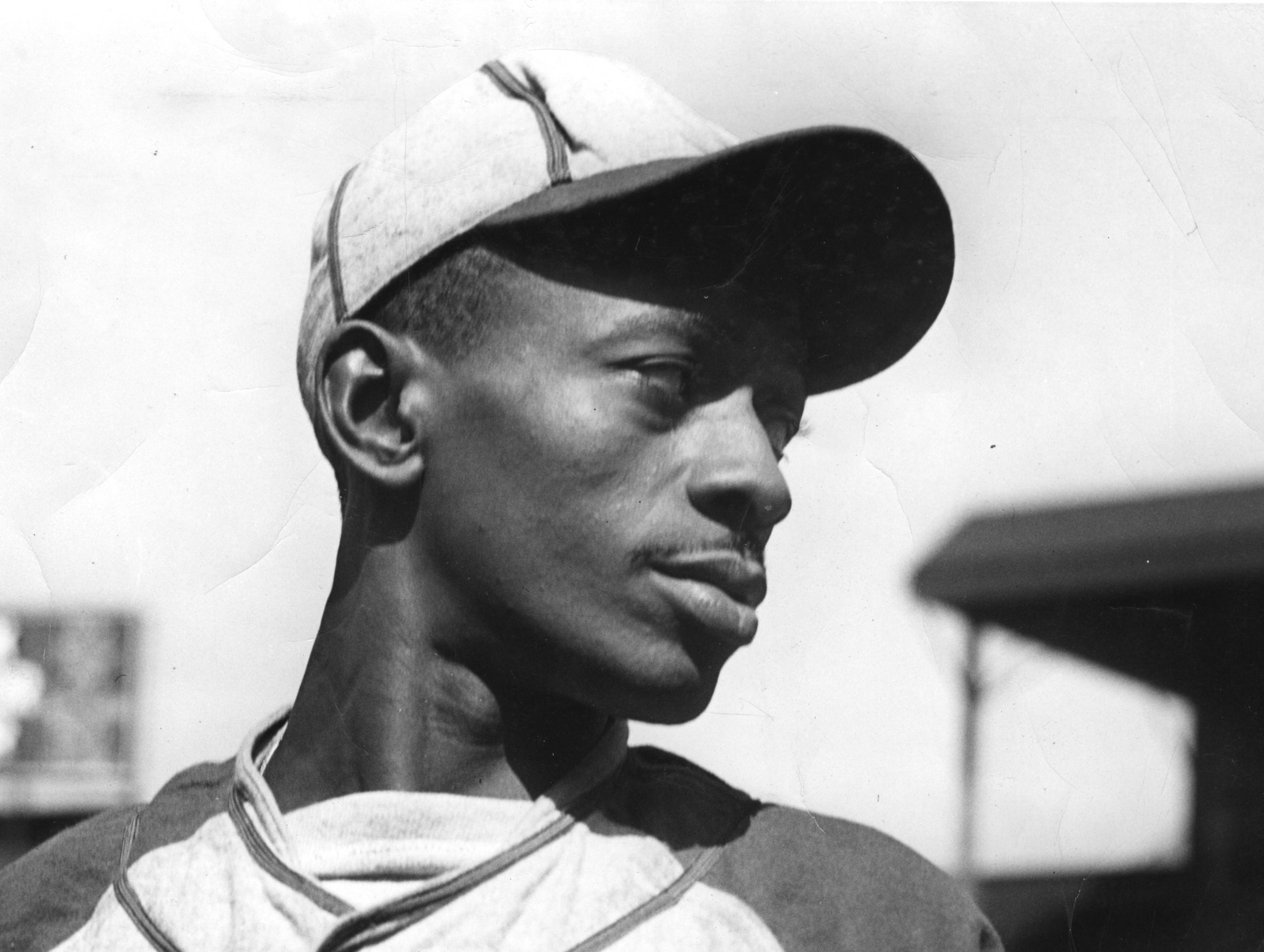- Home
- Our Stories
- Remembering Jackie
Remembering Jackie
Celebrate Jackie Robinson's legacy at the Hall of Fame
When he stepped onto the Ebbets Field grass on April 15, 1947, Jackie Robinson changed the landscape of the National Pastime - and the nation itself. It was a victory for civil rights, a momentous cultural shift and the beginning of a long journey... all embodied by the Brooklyn Dodgers first baseman.
And the passage of time seems only to heighten the importance of the moment.
The baseball world pauses each April 15 to celebrate Jackie Robinson Day on the anniversary of his National League debut. But the National Baseball Hall of Fame and Museum celebrates Robinson every day through The Souls of the Game exhibit, educational programs and the preservation of stories from his singular career.
His Legacy
Before You Could Say Jackie Robinson
One of 16 education thematic units offered by the National Baseball Hall of Fame and Museum’s education department, “Before You Could Say Jackie Robinson,” explores Civil Rights in the cultural development of America and baseball. Designed for students of all grades with levels for elementary school students, middle school students and high school students, the module illustrates how baseball reflected and led critical social shifts in American history, keyed by Robinson’s reintegration of the major leagues in 1947. The unit features stories of honor, courage and perseverance, brought to life through interactive multicultural lessons. For more information on the module and the Hall of Fame’s education programs, please visit baseballhall.org/education.
Check out a video featuring archival interviews about Jackie Robinson from the Hall of Fame Library.
his career
Jackie Robinson burst onto the scene in 1947, breaking baseball's color barrier and bringing the Negro Leagues’ electrifying style of play to the majors. He quickly became baseball’s top drawing card and a symbol of hope to millions of Americans. With Robinson as the catalyst, the Dodgers won six pennants in his 10 seasons, along with the 1955 World Series title over the New York Yankees. He dominated games on the base paths, stealing home 19 times while riling opposing pitchers with his daring baserunning style. Robinson was named National League MVP in 1949, leading the loop in hitting (.342) and steals (37), while driving in 124 runs.
Robinson Facts
- Born: January 31, 1919 in Cairo, Georgia Died: October 24, 1972, in Stamford, Connecticut
- Major league debut: April 15, 1947
- Teams: Kansas City Monarchs (1945) – Negro Leagues; Brooklyn Dodgers (1947-1956)
- Awards: Six-time All-Star (1949-1954), National League MVP (1949), Rookie of the Year (1947)
- Career Statistics: .311 batting average, 1,518 hits, 137 home runs, 734 RBI, 740 walks, 947 runs scored, 197 stolen bases
Jackie's Impact as a Player
From Jackie’s National League debut in 1947 until 1959, when the Boston Red Sox became the last of the 16 teams to integrate, Black players won nine Most Valuable Player Awards, nine Rookie of the Year Awards, five home run titles, four league batting crowns and a Cy Young Award.
The Black players capturing major awards in this span: Hank Aaron (1956 BAT, 1957 HR, 1957 MVP, 1959 BAT); Ernie Banks (1958 HR, 1958, 1959 MVP); Joe Black (1952 ROY); Roy Campanella (1951, 1953, 1955 MVP); Orlando Cepeda (1958 ROY); Larry Doby (1952, 1954 HR); Junior Gilliam (1953 ROY); Sam Jethroe (1950 ROY); Willie Mays (1951 ROY, 1954 MVP, 1954 BAT, 1955 HR); Willie McCovey (1959 ROY); Don Newcombe (1949 ROY, 1956 MVP, 1956 CYA); Frank Robinson (1956 ROY); and Jackie (1947 ROY, 1949 MVP, 1949 BAT).
Top Ten Moments
The National Baseball Hall of Fame and Museum presents the Top 10 moments in the career of Jackie Robinson:
- On October 23, 1945, Robinson was signed to a contract with the Brooklyn Dodgers by Branch Rickey.
- On April 18, 1946, Robinson debuted with the Montreal Royals of the International League as the starting second baseman. Robinson won the International League batting title in 1946.
- On April 15, 1947, 28-year-old Jackie Robinson made an historic debut for the Brooklyn Dodgers. Robinson went 0-for-3 in his debut but flawlessly handled 11 chances at first base against the Boston Braves.
- On Sept. 17, 1947, Robinson was named the Rookie of the Year by the Sporting News, though the season had two weeks remaining. In his rookie season, Robinson hit .297 with 12 home runs and 48 RBI in 151 games.
- On Nov. 18, 1949, Robinson was named the National League’s Most Valuable Player, batting .342 with 16 home runs and 124 RBI.
- On Sept. 28, 1955, at Yankee Stadium in Game 1 of the 1955 World Series, Jackie Robinson steals home in the top of the 8th inning to close the score to 6-5 Yankees. Frank Kellert was pinch-hitting for the Dodgers, with Whitey Ford pitching and Yogi Berra catching for New York. The Yankees would take the contest, 6-5, though the Dodgers would win the series in seven games.
- On July 23, 1962, Jackie Robinson is inducted into the National Baseball Hall of Fame in Cooperstown, New York.
- On October 15, 1972, just nine days before his death, in his last public appearance, Robinson throws out the first pitch before Game 2 of the 1972 World Series, and calls for Major League Baseball to hire a Black manager.
- On April 15, 1997, Major League Baseball universally retires Jackie Robinson’s number 42 for every major league team.
- On June 25, 2008, the National Baseball Hall of Fame and Museum unveils a re-cast Hall of Fame plaque for Jackie Robinson, to reflect his role in breaking baseball’s color barrier;
More About Jackie
Click below for additional information on Jackie Robinson’s career, including video, statistics, photos, artifacts, quotes and much more. Information on Jackie Robinson is also available at the website of the Jackie Robinson Foundation, jackierobinson.org.
His Place in Cooperstown
Jack Roosevelt Robinson earned his spot in Cooperstown in 1962, as part of an Induction class featuring Bob Feller, Bill McKechnie and Edd Roush. Robinson earned election on his first ballot, joining Feller from that year, as the first two first-ballot electees by the Baseball Writers’ Association of America since the inaugural 1936 Hall of Fame vote. Robinson earned votes on 77.5 percent (124 of 160) of all ballots cast.
Hall of Fame Induction Speech
Jackie Robinson delivered the following address on his Induction Day into the National Baseball Hall of Fame in Cooperstown on July 23, 1962…Robinson was introduced by Ford C. Frick:
“Thank you very much, Mr. Frick. First let me say how much of a thrill it is to be coming into the Hall of Fame with Bob Feller, Mr. McKechnie, and Mr. Roush. I want to also let you know that I feel quite inadequate here this afternoon, or this morning. But I think a lot of this has been eliminated, because today, it seems that everything is complete.
First of all, I want you to know that this honor that was brought upon me here could not have happened without the great work and the advice and guidance that I’ve had from three of the most wonderful people that I know. And if any of them weren’t here today, I know that this day could not be complete. But, they’re all here and I just hope you don’t mind if I just pay a word of thanks and a tribute to my advisor and a wonderful friend, a man who I consider a father, Mr. Branch Rickey.
And my mother, who taught me so much of the important things early in life. I appreciate no end, my mother Mrs. Robinson. And lastly, ladies and gentlemen, my wife, who has been such a wonderful inspiration to me. And the person who has guided and advised me throughout our entire marriage. I couldn’t have been here today without her help.
And then I...and I must thank the baseball writers…I never thought at all that I would have this wonderful honor coming to me so early in my lifetime. And to have the writers to elect me on the first time is a thrill that I shall never forget. We have been up in cloud nine since the election. I don’t ever think I’ll come down. But I want to thank all of the people throughout this country who were just so wonderful during those trying days. I appreciate it at no end and it’s the greatest honor any person could have and I only hope that I’ll be able to live up to this tremendously fine honor. It’s something that I think those of us who are fortunate again, must use in order to help others. Because it’s such a tremendous honor that we should be able to go out and do things to help. I’m just grateful and I’m sorry I’ve taken so long, but I just wanted you to know that I appreciate it so much. Thank you.”
Hall of Fame Plaque
On June 25, 2008, The National Baseball Hall of Fame and Museum unveiled a new Hall of Fame plaque for Hall of Fame member Jack Roosevelt “Jackie” Robinson in Cooperstown. Rachel Robinson, the widow of the 1962 Hall of Fame inductee, and their daughter, Sharon, were present for the event, which featured remarks by Hall of Fame Board Chairman Jane Forbes Clark.
“When he earned election to the Hall of Fame in 1962, Jackie Robinson totaled a career worthy of inclusion, based on performance alone,” Clark said. “He told baseball writers that when considering his candidacy, they should only consider his playing ability – what his impact was on the playing field. At his induction in 1962, his plaque reflected his wishes – it only recounted his magnificent playing career. But as we all know, there’s no person more central and more important to the history of baseball, for his pioneering ways, than Jackie Robinson. Today, his impact is not fully defined without mention of his extreme courage in crossing baseball’s color line. We are proud of the changes we have made.”
The new plaque is now on display in the Hall of Fame Gallery, replacing the original plaque in its same location, while the old plaque will remain a part of the Museum’s collections and will be used for educational purposes. Text from the new Jackie Robinson Hall of Fame plaque reads as follows:
JACK ROOSEVELT ROBINSON
“JACKIE”
BROOKLYN, N.L., 1947-1956
A PLAYER OF EXTRAORDINARY ABILITY RENOWNED FOR HIS ELECTRIFYING STYLE OF PLAY. OVER 10 SEASONS HIT .311, SCORED MORE THAN 100 RUNS SIX TIMES, NAMED TO SIX ALL-STAR TEAMS AND LED BROOKLYN TO SIX PENNANTS AND ITS ONLY WORLD SERIES TITLE, IN 1955. THE 1947 ROOKIE OF THE YEAR, AND THE 1949 N.L. MVP WHEN HE HIT A LEAGUE-BEST .342 WITH 37 STEALS. LED SECOND BASEMEN IN DOUBLE PLAYS FOUR TIMES AND STOLE HOME 19 TIMES. DISPLAYED TREMENDOUS COURAGE AND POISE IN 1947 WHEN HE INTEGRATED THE MODERN MAJOR LEAGUES IN THE FACE OF INTENSE ADVERSITY.
Text from the old Jackie Robinson Hall of Fame plaque reads as follows:
JACK ROOSEVELT ROBINSON
BROOKLYN N.L. 1947 TO 1956
LEADING N.L. BATTER IN 1949. HOLDS FIELDING MARK FOR SECOND BASEMAN PLAYING IN 150 OR MORE GAMES WITH .992. LED N.L. IN STOLEN BASES IN 1947 AND 1949. MOST VALUABLE PLAYER IN 1949. LIFETIME BATTING AVERAGE .311. JOINT RECORD HOLDER FOR MOST DOUBLE PLAYS BY SECOND BASEMAN, 137 IN 1951. LED SECOND BASEMAN IN DOUBLE PLAYS 1949-50-51-52.
Famous Quotes Spoken by Jackie Robinson
- "A life is not important except in the impact it has on other lives."
- "I'm not concerned with your liking or disliking me. All I ask is that you respect me as a human being."
- "Life is not a spectator sport. If you're going to spend your whole life in the grandstand just watching what goes on, in my opinion you're wasting your life."

